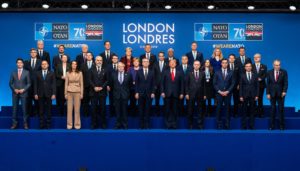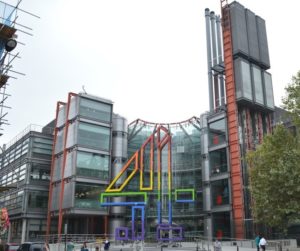by William Crawley, Senior Research Fellow, Institute of Commonwealth Studies
The principles of freedom of information and freedom of expression are regarded as the core of shared values to which Commonwealth governments aspire. In practice many Commonwealth countries give cause for real concern. National elections in India earlier in the year showed the dangers which many Indian journalists face not just in their freedom to report but in their exposure to physical, at worst lethal, violence.
As long-established and mature parliamentary democracies, both Britain and Canada are taking a leading role in promoting these principles and media freedoms globally and within the Commonwealth. But recent elections in both Britain and in Canada have justifiably invited scrutiny of aspects of their own record. The principles adopted by Commonwealth Heads of Government in 2003, known as the Latimer House principles, endorsed the aim of enabling “an independent and vibrant media which is protected by law in its freedom to report and comment on public affairs”. In 2017 the Commonwealth Journalists Association and the Institute of Commonwealth Studies, together with other Commonwealth professional associations, and in support of an earlier CJA initiative, established a Working Group on ‘Media and Good Governance’. The principles on Freedom of Expression and the Role of the Media in Good Governance which they agreed in 2018 highlighted among other things ‘the essential role of the media in the democratic process, especially during times of elections and referenda’.
In Canada there has been controversy not so much on the application of the law to the exercise of media freedoms during the election campaign, but on newly-amended provisions of the Canada Elections Act (CEA). Section 91 of the CEA makes it an offence to publish statements during the election period about political candidates and other public figures which are deemed ‘false’. The prohibition leaves words like ‘false’ and ‘public figure’ undefined. The Canadian Constitutional Foundation, a right wing lobby group, have argued that this could be used to shut down political speech that is protected by the Canadian Charter of Rights and Freedoms, a fundamental part of the Canadian constitution since 1982. They argue – though this even the CCF admit would be an extreme interpretation – that it might even be used to stifle political debate about climate change. In a ‘post-truth’ age when the concepts of ‘truth’ and ‘falsehood’ are routinely derided, the Charter’s support for ethical media practices could be seen as restrictive, and new definitions are called for.

Canadian Prime Minister Justin Trudeau (bottom row, first from left) was caught on camera seemingly mocking US President Donald Trump (bottom row, seventh from left) at a reception following the 2019 NATO summit in London while speaking with UK Prime Minister Boris Johnson (bottom row, fifth from left), Dutch Prime Minister Mark Rutte (top row, fourth from left), and French President Emmanuel Macron (second row, fourth from left)
The issue that gained most international publicity during the Canadian election campaign could hardly be described either as a constitutional matter or one or truth of falsehood. Images of a youthful Justin Trudeau at a themed party wearing so-called ‘blackface’ makeup became an acute source of embarrassment to the prime minister during his re-election campaign nearly twenty years later. These were undoubtedly tasteless at the time, and awareness of racist tropes and racial discrimination has grown immeasurably in the intervening years. At the same time, their prominence in the media hardly showed the best side of journalistic principles and ethics. The capture on camera of an unguarded moment during the NATO summit in London, on the eve of the British election, with Mr Trudeau apparently joking with other prominent politicians at the expense of President Trump, arguably carried a more valid and contemporary political message, one with serious implications.
In the British election campaign, the media made the most of Boris Johnson’s many questionable assertions, as was to be expected in a bitterly divided campaign in which so much was at stake. The concept of ‘fake news’ has lost its ability to shock since it was first brought into common currency by the Trump administration and President Trump himself. A common perception is that governments and political parties – not to speak of the social media – have been offenders as much or more than the mainstream media. But there were elements in the British election campaign in which more than personal or partisan embarrassment was at stake. The Conservative campaign headquarters, in rebranding its own Twitter account as ‘factcheckUK’, was creating a conscious parody of one of the more encouraging trends in underscoring responsible journalism in the media The Conservative Party’s so-called ‘fact-checking’ service was revived to celebrate Boris Johnson’s election victory.

Channel 4 headquarters in London. Via Wikimedia Commons
One of the key principles recommended by the Commonwealth Working group is that public broadcast services should operate under governance frameworks which guarantee their editorial independence. On two occasions at least, the Conservative party and Prime Minister Johnson made specific threats to public service broadcasting institutions. The first was to the television network Channel 4, when a Conservative party source threatened to review Channel 4’s broadcasting remit if they won the general election. During a debate between party leaders on climate change in which Boris Johnson had declined to take part, the Channel had replaced him with a sculpture of melting ice. The Channel’s license currently runs to 2024 and its output, like that of the BBC, is subject to the media regulator Ofcom. Channel 4 is owned by the state and the legislation setting it up could be altered by parliament at any time.
At another point in the campaign the prime minister said that if he were re-elected he would consider abolishing the BBC’s main source of income, the compulsory license fee. Either of these policy proposals would be within the power of a government, but the current BBC Charter started in January 2017 and lasts to the end of 2027. The Government would carry out a mid-term review of the Charter but that is not intended as a full Charter Review, and would, in theory, not look at the BBC’s mission, purpose, or the method by which it is funded. So while a review of Channel 4 would fall in the government’s current expected 5 year term, a full review of the BBC is not scheduled until after the next general election.
Boris Johnson’s decisive election victory has turned these campaign threats to both major public service broadcasters into real possibilities, and the broadcasters may legitimately regard themselves as on notice. But the independence of public service broadcasters is a major platform of the media freedoms that British governments have repeatedly committed to protecting and promoting. Their dilution would do little for Britain’s international reputation.

Recent Comments